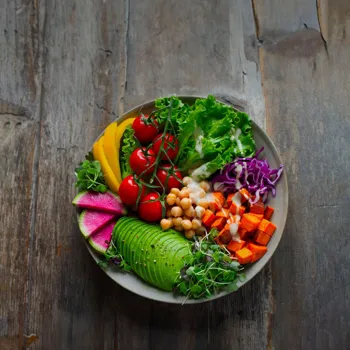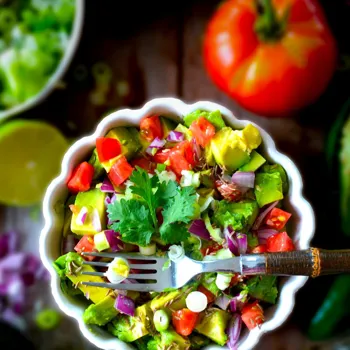10 Common Nutrition Mistakes & How to Avoid Them: Guide for Healthy Eating. Learn to make better choices daily!
In our busy lives, eating right often takes a backseat. We all know that good nutrition is
important for our health and well-being, but sometimes we unknowingly make mistakes that can hinder our progress.

This article highlights ten common nutrition mistakes and offers practical tips on how to avoid them, helping you make healthier choices every day.
Skipping Breakfast:
Breakfast truly is the most important meal of the day! Many folks skip breakfast thinking it will help them lose weight or save time. But starting your day with a nutritious meal kick-starts your metabolism, providing you with the energy you need to power through the morning.

Eating breakfast also helps you focus better and prevents overeating later in the day. When you are very hungry you tend to choose anything which comes your way! Make time for a simple breakfast like poha with vegetables or oats with fruits and nuts.
This will fuel your body and keep you satisfied until lunchtime.
Not Drinking Enough Water:
Water is essential for life. It helps in various bodily functions, including digestion, circulation, and temperature regulation. Many of us don't drink enough water throughout the day, leading to dehydration which can cause fatigue, headaches, and even constipation.

Carry a water bottle with you and sip on it throughout the day. Drinking water before meals can also help you feel fuller and prevent overeating. Also, consider adding fruits and vegetables with high water content to your diet, such as watermelon, cucumber, and spinach.
The thirst sensation often gets confused with hunger. So next time before you grab that snack, drink a glass of water and wait!
Ignoring Portion Sizes:
Even if you're eating healthy foods, consuming large portions can lead to weight gain. It's important to be mindful of portion sizes and avoid overeating. Get familiar using measuring cups and spoons to control your portions. Eating from smaller plates can also create an illusion of abundance.

Pay attention to your body's hunger and fullness cues instead of mindlessly eating until your plate is clean. This ensures that you are providing just enough fuel to do your daily activities. Practicing mindful eating helps a lot.
You cannot simply pop in the food while travelling or watching the telly.
Snacking on Processed Foods:
Packaged snacks like chips, biscuits, and sugary drinks are often loaded with unhealthy fats, sugar, and sodium. These foods provide empty calories and little to no nutritional value. They can also lead to energy crashes and cravings for more unhealthy foods.
Instead of reaching for processed snacks, opt for healthy alternatives like fruits, nuts, seeds, or yogurt. These provide essential nutrients and will keep you feeling satisfied and energized. This may require a bit of planning.
Prep yourself with trail mixes of nuts and seeds or carry small fruit with you.
Not Eating Enough Fiber:
Fiber is crucial for digestion, regulating blood sugar levels, and promoting heart health. Many people do not get enough fiber in their daily diet. Include fiber-rich foods in your meals, such as whole grains, fruits, vegetables, and legumes.
These foods will keep you feeling fuller for longer and prevent overeating. You can also add flaxseeds or chia seeds to your smoothies or yogurt for an extra boost of fiber. Make modifications to your daily intake and include fiber rich options. Dalia or millet are great high fiber sources.
Overdoing it with Sugar:
Excessive sugar consumption can lead to weight gain, tooth decay, and increased risk of chronic diseases like diabetes. Be mindful of your sugar intake and avoid sugary drinks, processed desserts, and candies. Opt for natural sweeteners like honey or jaggery in moderation.

Read food labels carefully to identify hidden sugars in packaged foods. A great way to reduce your intake of sugar is to make homemade food which contains less sugar and artificial sugar. Do also check on the consumption of sauces and condiments, which are a great source of sugar.
Relying on Fad Diets:
Fad diets that promise quick weight loss are often unrealistic and unsustainable. They might lead to temporary weight loss, but they often result in nutrient deficiencies and rebound weight gain. Instead of following fad diets, focus on making sustainable lifestyle changes.
Focus on eating a balanced diet and be physically active. Consult a registered dietitian or nutritionist for personalized guidance. These experts can guide you on the right balance.
Not Reading Food Labels:
Many of us simply pick up items when shopping, without reading the food labels. This is dangerous because you simply don't know what is in that item.
Food labels inform about nutrition, serving sizes, and ingredients for healthy choices
Food labels can provide valuable information about the nutritional content of foods, including calories, fat, sugar, and sodium. They help you make informed choices about what you're eating. Read food labels carefully and pay attention to serving sizes, ingredients, and nutrient information.

Avoid foods that are high in unhealthy fats, sugar, and sodium. If you are on medications check with your doctors about the labels!
Eating Too Quickly:
In today's fast-paced world, we often tend to gobble down our meals in a rush, without giving our bodies a chance to register fullness.

Eating too quickly can lead to overeating and poor digestion. Take your time during meals and savor each bite. Chew your food thoroughly and pay attention to your body's hunger and fullness cues. Eating slowly allows your brain to receive signals from your stomach that you are full, preventing you from overeating. You can try to keep your mobile/ telly away when having meals.
Ignoring Your Body’s Signals:
Listen to your body when it comes to hunger and fullness. Don't ignore your hunger cues or force yourself to eat when you're not hungry. Pay attention to how different foods make you feel. If certain foods cause discomfort or digestive issues, avoid them.
Respecting your body's signals is essential for developing a healthy relationship with food.
By making small, sustainable changes to your eating habits, you can improve your overall health and well-being. Remember that nutrition is a journey, not a destination. Be patient with yourself and celebrate your progress along the way.
By avoiding these common nutrition mistakes and adopting healthy eating habits, you can nourish your body and achieve your health goals. Remember, small changes can make a big difference in the long run. Stay consistent, stay informed, and stay healthy!




















